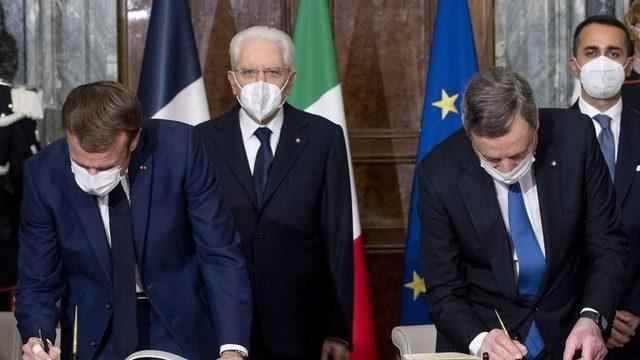An agreement was signed between Italy and France to strengthen cooperation in many areas such as environment-climate, security, culture and economy in the Mediterranean and Africa.
The text, called the “Quirinale Agreement” by the Italian Presidential Palace, is likened to the Elysée Agreement signed by France and Germany in 1963.
Agreement; Due to reasons such as the pandemic, Brexit and the end of the Angela Merkel era in Germany, it is considered as a step of joining forces against the risk of instability in the European Union (EU).
The agreement signed in Rome this morning by Italian Prime Minister Mario Draghi and French President Emmanuel Macron symbolizes a turning point in terms of relations between the two countries.
‘Strong Europe’ emphasis
It is seen as an attempt to end the tensions between Italy and France in recent years and to establish a “strong Europe” oriented partnership.
Although the first steps of the France-Italy agreement were taken in 2017, it was interrupted in Italy in 2018 when the right-populist coalition government came to power.
Italy-France relations have often been marked by tensions and crises in recent years.
Migrant crossings between the borders of the two countries, international conflicts of interest, as in the case of Libya, the yellow vest protests in France, and even Leonardo da Vinci caused mutual quarrels.
France withdrew its ambassador to Rome
Tensions in Italy when the right-wing populist coalition government was in power reached its peak at the beginning of 2019 when France briefly recalled its ambassador to Rome. The event that led to this crisis was Italy’s Foreign Minister Luigi Di Maio’s support for the Yellow Vests protests in France.
Luigi Di Maio also took part in today’s signing ceremony as Minister of Foreign Affairs, but this time as the minister of a right-wing nationalist-populist government, but a broadly attended coalition government led by pro-EU technocrat Mario Draghi as prime minister.
In this agreement with France, the fact that Italy passed to the management of former European Central Bank President Mario Draghi is seen as effective.
The Draghi administration is taking steps for a strong EU and an Italy that plays a more effective role in this union.
The goal of strengthening the EU against the anti-EU, nationalist, populist movements and foreign influences that have gained strength in many European countries, including Italy, is among the focal points of the Italy-France agreement.
Draghi and Macron, who held a press conference in Rome today due to the signing of the agreement, also gave messages reiterating this “strong EU” goal.
‘We must decide the future of Europe’
Italian Prime Minister Mario Draghi counted items such as “deciding the future of Europe as us Europeans, preventing others from making decisions, a common European defense and the protection of European borders” among the aims of the agreement.
Draghi described this as an attempt to “search for a more sovereign Europe, to establish the means to make the EU stronger”.
French President Emmanuel Macron also gave the message that they want a “stronger and more sovereign Europe” and said, “France and Italy share a geopolitical vision. We will cooperate for a stronger EU defense that contributes to NATO.”
Government sources in Italy also stated that the cooperation aims to “strengthen the international action capacity of the EU and the union and to promote common priorities for the two countries together”.
